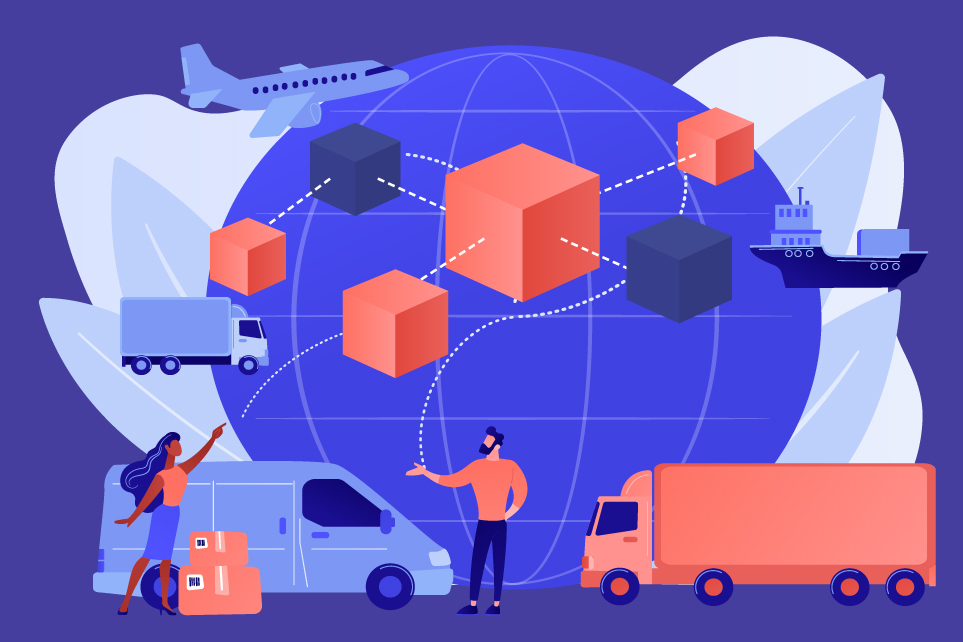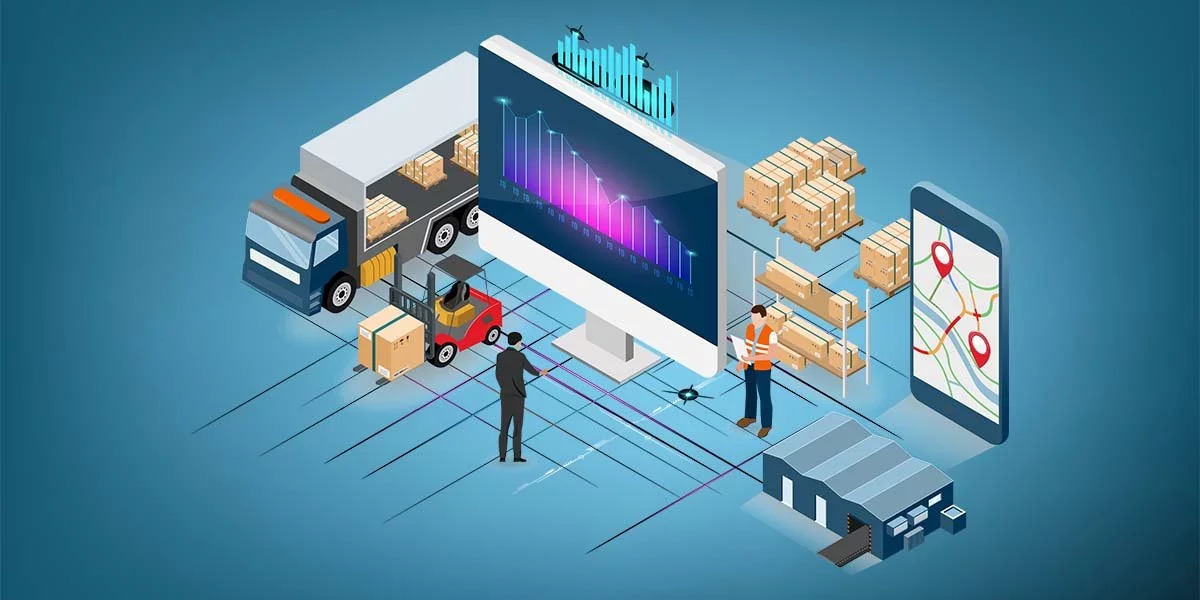Welcome to the future of logistics! In an era where digital transformation is reshaping industries, blockchain technology has emerged as a revolutionary force. This transformative technology is not only disrupting financial sectors but also revolutionizing supply chain management and logistics.
Imagine a world where every transaction, every movement of goods, and every piece of information is securely recorded, transparently verified, and tamper-proof. Blockchain makes this possible by providing a decentralized network that eliminates intermediaries and facilitates direct peer-to-peer interactions.
We will explore how integrating blockchain technology in B2B logistics automation can bring forth unparalleled benefits for businesses worldwide. From enhanced transparency to streamlined processes and cost savings – get ready to dive into the exciting realm of blockchain-powered logistics automation!
Benefits of Blockchain in B2B Logistics Automation
Blockchain technology has revolutionized various industries, and B2B logistics is no exception. By integrating blockchain into logistics automation processes, businesses can enjoy numerous benefits that streamline operations and enhance efficiency.
One key advantage of using blockchain in B2B logistics automation is increased transparency. With a distributed ledger system, all stakeholders have real-time access to the same information, eliminating discrepancies or delays often associated with traditional paper-based systems. This transparency enhances trust among partners and reduces the risk of fraud or errors.
Blockchain enables secure and tamper-proof data storage. Each transaction recorded on the blockchain is encrypted and linked to previous transactions through cryptographic hashes. This ensures data integrity throughout the supply chain process, preventing unauthorized modifications and safeguarding sensitive information.
Implementing blockchain in B2B logistics automation can significantly reduce costs by eliminating intermediaries such as brokers or third-party auditors. The decentralized nature of blockchain allows for direct peer-to-peer interactions between participants, reducing administrative overheads and speeding up transaction processing times.
Smart contracts powered by blockchain technology enable automated execution of predefined terms once specified conditions are met. These self-executing contracts eliminate manual interventions during contract enforcement stages while ensuring compliance with agreed-upon terms between parties involved in the supply chain ecosystem.
Another benefit lies in enhanced traceability within the supply chain network. Blockchain provides an immutable record of every transaction made along the journey from manufacturer to end consumer. This level of traceability allows businesses to track products’ origins, quality assurance processes conducted at each stage, and ensure adherence to regulatory standards.
Leveraging blockchain technology helps improve overall efficiency within B2B logistics operations by streamlining documentation processes like invoicing or customs clearance procedures through digitization and automation capabilities provided by smart contracts.

Challenges in Implementing Blockchain in B2B Logistics
Implementing blockchain technology in the B2B logistics industry comes with its own set of challenges. One major challenge is the lack of standardization and interoperability across different platforms and systems. As blockchain requires all participants to use the same protocols, it can be difficult to integrate existing legacy systems into a blockchain network.
Blockchain networks rely on consensus mechanisms, such as proof-of-work or proof-of-stake, which can lead to slower transaction processing times compared to traditional centralized databases. This could pose a problem for logistics companies that require real-time visibility and rapid transaction speeds.
Security is another concern when implementing blockchain in B2B logistics automation. While blockchain offers enhanced security through cryptographic algorithms, there are still vulnerabilities that need to be addressed, such as private key management and potential attacks on smart contracts.
Regulatory compliance poses a challenge for organizations looking to adopt blockchain in their logistics processes. Different countries have varying regulations around data privacy and ownership rights, which may conflict with the decentralized nature of blockchain technology.
There is resistance from stakeholders who may be hesitant to embrace new technologies due to concerns about cost, complexity, or fear of job displacement. Convincing key decision-makers about the benefits of implementing blockchain can be an uphill battle.
Despite these challenges, many companies are actively exploring pilot projects and partnerships aimed at addressing these issues head-on. With continued innovation and collaboration within the industry, we can overcome these obstacles and unlock the full potential of integrating blockchain technology into B2B logistics automation.
Real-life Examples of Successful Implementation
Blockchain technology has gained significant traction in various industries, including B2B logistics automation. Several companies have successfully integrated blockchain into their operations, revolutionizing the way they manage supply chains and streamline processes.
One prime example is Maersk, a global shipping company that partnered with IBM to create TradeLens. This blockchain-based platform allows shippers, freight forwarders, ports, and customs authorities to collaborate and share real-time data securely. By digitizing the documentation process and enabling transparent tracking of goods from origin to destination, Maersk has significantly reduced paperwork and improved efficiency in the logistics ecosystem.
Another notable success story is Walmart’s implementation of blockchain for food traceability. Through its partnership with IBM Food Trust network, Walmart ensures transparency across its supply chain by leveraging blockchain technology. The system enables quick identification of contaminated products or recalls by tracing products back to their source within seconds instead of days.
Provenance is using blockchain to bring transparency into product sourcing in the fashion industry. By connecting different stakeholders involved in the supply chain – from farmers growing cotton to manufacturers producing garments – Provenance ensures ethical practices are followed throughout each step.
These examples demonstrate how integrating blockchain technology can enhance trust, security, and efficiency in B2B logistics automation. With more companies realizing the potential benefits of this innovative solution, we can expect further advancements in streamlining supply chains globally.
Future Predictions and Opportunities for Growth
As blockchain technology continues to evolve, its potential in the B2B logistics industry is becoming increasingly evident. The future holds exciting possibilities for integrating blockchain into logistics automation processes.
One of the key predictions is that blockchain will enhance transparency and traceability in supply chains. By creating a decentralized ledger system, it will enable real-time visibility into every step of the logistics process. This increased transparency can help reduce instances of fraud, theft, and counterfeiting.
Another prediction is that implementing blockchain in B2B logistics automation will lead to improved efficiency and cost savings. Smart contracts can automate various tasks such as invoice reconciliation and payment processing, reducing manual errors and streamlining operations. Additionally, by eliminating intermediaries from transactions, businesses can reduce costs associated with third-party services.
Blockchain also has the potential to revolutionize inventory management through enhanced data accuracy and real-time tracking capabilities. This could lead to more efficient inventory planning and reduced out-of-stock situations.
As blockchain adoption increases within the B2B logistics sector, new business models may emerge. Collaborative platforms powered by blockchain could facilitate direct peer-to-peer interactions between manufacturers, suppliers, distributors, and retailers without the need for traditional intermediaries.
Opportunities for growth abound in industries like pharmaceuticals where product authenticity is critical or perishable goods where temperature control during transportation is essential. Blockchain offers a secure method of verifying product origin while ensuring adherence to temperature requirements throughout the supply chain.
The future looks promising for integrating blockchain technology into B2B logistics automation processes. With increased transparency, improved efficiency, enhanced inventory management capabilities – there are countless opportunities for growth across industries seeking secure transactions with reduced costs and better operational outcomes.
Steps to Integrate Blockchain in B2B Logistics Automation
1. Identify the pain points: Start by identifying the specific pain points within your B2B logistics processes that blockchain can address. This could be anything from inefficient documentation management to lack of transparency in supply chain tracking.
2. Choose the right platform: Select a suitable blockchain platform that aligns with your business requirements and offers the necessary features for logistics automation. Consider factors such as scalability, security, and ease of integration with existing systems.
3. Define smart contracts: Smart contracts are self-executing agreements that automatically trigger actions based on predefined conditions. Define these contracts to automate various aspects of your logistics operations, such as payment processing or shipment verification.
4. Collaborate with stakeholders: Involve all relevant stakeholders in the integration process – suppliers, manufacturers, distributors, and carriers. Ensure they understand how blockchain technology will benefit their respective roles and encourage their active participation.
5. Test and refine: Conduct thorough testing before implementing blockchain technology across your B2B logistics network. Identify any potential issues or bottlenecks early on and make necessary refinements to ensure smooth implementation.
6. Implement gradually: Instead of rolling out blockchain across all operations at once, consider implementing it gradually in phases or pilot projects first.
7. Monitor performance metrics: Continuously monitor key performance metrics related to cost savings, efficiency gains,and customer satisfaction after integrating blockchain technology into your B2B logistics automation efforts.
By following these steps,the integration of blockchain technology can revolutionize B2B logistics automation,enabling greater efficiency,cost-effectiveness,and transparency throughout the supply chain.
Embracing the Future of B2B Logistics with Blockchain Technology
As we have explored throughout this article, blockchain technology holds immense potential for revolutionizing B2B logistics automation. Its decentralized nature, immutability, and transparency offer numerous benefits that can streamline supply chain operations and enhance trust among stakeholders.
By integrating blockchain into B2B logistics automation, companies can experience improved efficiency, reduced costs, enhanced security, and increased traceability. These advantages not only benefit individual businesses but also contribute to the overall growth of the industry.
While there are challenges in implementing blockchain in B2B logistics, such as scalability issues and regulatory concerns, many real-life examples have shown successful integration. Companies like Walmart and Maersk have demonstrated how blockchain can transform supply chain processes by enabling end-to-end visibility and reducing paperwork.
Looking ahead to the future of B2B logistics with blockchain technology, there are exciting opportunities for growth. As more industries recognize the value of adopting this innovative solution, we can expect widespread adoption across various sectors such as manufacturing, retailing, healthcare, and more.
Blockchain technology has emerged as a game-changer in transforming traditional B2B logistics processes into efficient automated systems capable of supporting complex supply chains globally. By embracing this disruptive technology today rather than later, reap significant rewards tomorrow.



